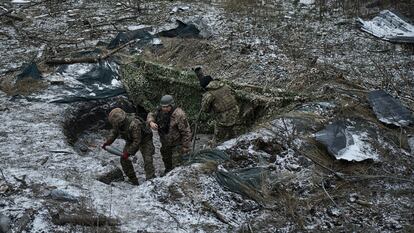End-of-year emergencies
Ukrainians and Palestinians are bearing the brunt of the death, destruction and uncertainty about the future

Victory is unlikely, perhaps unattainable. If few believe that Ukraine can recover the territories annexed by Russia, even fewer believe that Vladimir Putin will be the winner, that the Russian president will set up a puppet government in Kyiv and reintegrate it into the post-Soviet space. Something similar is happening in the Middle East, where it is difficult to imagine that Benjamin Netanyahu will liquidate Hamas and even more difficult to believe that Hamas has any possibility of implementing its plan to destroy Israel and expel the Jews from the territory between Jordan and the Mediterranean.
Ukraine’s forces are exhausted, short of ammunition and combatants, there are divisions between military and civilian leaders, allies are faltering and the enemy’s defensive resilience is great. Russian forces — recovered from their successive defeats and entrenched in the war of attrition — know that any possibility of a genuine victory is gone, since Ukraine has been recognized as a candidate to join NATO and is now beginning talks to negotiate its accession to the European Union. The symbol of Ukraine’s final farewell to the Russian world was the decision to move the Ukrainian Christmas holiday from January 7 on the Orthodox calendar to December 25 on the Western Christian calendar.
In the three months of Israel’s devastating offensive on Gaza, Netanyahu has not been able to topple the leadership of Hamas and has only managed to forcibly free a single hostage — far from the reasonable objectives that would allow it to declare itself the winner and end an operation that is costing lives, destruction and even Israel’s reputation. Nor can Hamas leaders be satisfied, despite the group’s gruesome success on October 7, when they launched a bloody raid on Israeli territory and took hostages as negotiating leverage. As usually happens in any war, the surprise of the Hamas attack has been followed by the surprise of a reaction whose destructive scope has surpassed the expectations of the provocateurs themselves. The momentary popularity of Hamas among Palestinians will hardly prevent the eternal resentment for the consequences of their brutal and fanatical provocation — which has endangered, this time existentially, the very Arab nation they pretend to save.
There are usually no definitive victories in today’s wars, but rather defeats for everyone, although in different proportions. Ukrainians and Palestinians are bearing the brunt of the death, destruction and uncertainty about the future. Putin and Netanyahu are hiding behind the claims of the so-called existential danger facing Russia and Israel, respectively, but the damage that their countries are suffering is affecting their soul — not their existence. In the policy of force, expansionism, hostility towards multilateralism and international institutions, supremacist ethno-nationalism and limiting democracy and the rule of law, the imperial and mafia authoritarianism of the Kremlin dangerously converges with the Zionism of Israel’s most extremist government in history.
These elusive victories do not lead to peace, but rather trigger an endless chain of war. War is a complete defeat. Only those who feel legitimized by the politics of force are bound to war, and they tend to reduce all politics to it. Escalations — and the enormous risks they entail — suit these intransigents, who only value the enemy’s complete surrender. That’s why they find reasons to criticize any past agreements with the enemy, arguing that these are the cause and not the remedy for war. As we head into the New Year, we must urgently call for a definitive ceasefire and for negotiations that will return some peace and justice to Ukraine and Palestine.
Sign up for our weekly newsletter to get more English-language news coverage from EL PAÍS USA Edition
Tu suscripción se está usando en otro dispositivo
¿Quieres añadir otro usuario a tu suscripción?
Si continúas leyendo en este dispositivo, no se podrá leer en el otro.
FlechaTu suscripción se está usando en otro dispositivo y solo puedes acceder a EL PAÍS desde un dispositivo a la vez.
Si quieres compartir tu cuenta, cambia tu suscripción a la modalidad Premium, así podrás añadir otro usuario. Cada uno accederá con su propia cuenta de email, lo que os permitirá personalizar vuestra experiencia en EL PAÍS.
¿Tienes una suscripción de empresa? Accede aquí para contratar más cuentas.
En el caso de no saber quién está usando tu cuenta, te recomendamos cambiar tu contraseña aquí.
Si decides continuar compartiendo tu cuenta, este mensaje se mostrará en tu dispositivo y en el de la otra persona que está usando tu cuenta de forma indefinida, afectando a tu experiencia de lectura. Puedes consultar aquí los términos y condiciones de la suscripción digital.









































